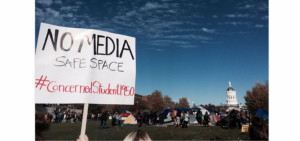According to The Safe Space Network, this is the definition of a “safe space”:
A Safe Space is a place where anyone can relax and be able to fully express, without fear of being made to feel uncomfortable, unwelcome, or unsafe on account of biological sex, race/ethnicity, sexual orientation, gender identity or expression, cultural background, religious affiliation, age, or physical or mental ability.
Lately, as an advocate for social justice, a supporter of Black Lives Matter and Fight for 15 and marriage equality and trans* rights and a host of other social equality issues, I’ve been encountering numerous videos and articles highlighting the proliferation of “safe spaces” on college campuses, and it’s about time that adults address a simple reality regarding this growing concept.
You do not have a natural right to not feel uncomfortable.
Discomfort is the entire point of struggle. We put ourselves in discomfort when we march on cold streets and hear the cold words of our neighbors supporting the status quo. We put others in discomfort when we block a highway to get the cameras turned our way so that we may highlight the real discomforts of police brutality, low wages, lifelong student debt, homelessness, high unemployment and the work/life balance for those of us fortunate enough to have a stable job. Struggle never will — and never should — be comfortable.
So maybe you’re not part of the struggle. Maybe you’re just a sensitive person on campus and you simply want to get through public spaces without harassment. Obviously, on this point, we can all agree. Things like catcalling and inappropriate touching are never acceptable. They should be called out and shouted down when encountered. I’d be hard-pressed to find anyone, of any political persuasion, who believes that street harassment is somehow acceptable.
The issue arises from the ever-expanding definition of harassment. Eye contact is not harassment. Walking within a foot of you is not an invasion of your space. Carrying a yoga mat is not cultural appropriation. Filming a public event is not a violation of your privacy. A counterargument to your public speech is not a type of violence.
In a public space, everyone has the same level of right to exist and be heard, and free speech doesn’t protect you from being offended. The type of world you promote with “safe spaces” is the type of world where no debate takes place for fear of hurt feelings, and without debate and protest, we wouldn’t be celebrating marriage equality or inching ever closer to a minimum living wage. In order to create progress, we must struggle, and struggle will never be comfortable. This shouldn’t be a problem. It should be embraced, because it is the struggle that unites us.
I think back to a few months ago when Bernie Sanders was ridiculed by those in the BLM movement for speaking on economic terms when he was asked if black lives mattered to him. In reality, the educational system, the justice system, the employment situation, the housing situation, all of these roadblocks to the betterment of impoverished communities which adversely impact people of color do indeed come down to economics. However, Sanders was criticized for not speaking more plainly about race itself.
Identity politics has become a roadblock to progress. Intersectionality is an important thing to discuss and to better ourselves on a philosophical level, but we can’t allow our varying levels of privilege to place us in boxes and rank us against one another. There was a time when oppressed people, regardless of their comparative levels and types of oppression, stood in solidarity without counting privilege points because they knew that solidarity is our most powerful weapon. Today, solidarity is dying at the hands of a young population which would rather silence dissent and protect feelings than struggle and make progress. It is time to put this embarrassing sideshow behind us and embrace struggle.
You do not have a natural right to not feel uncomfortable.
That discomfort is struggle, and struggle is necessary if you want to win.
